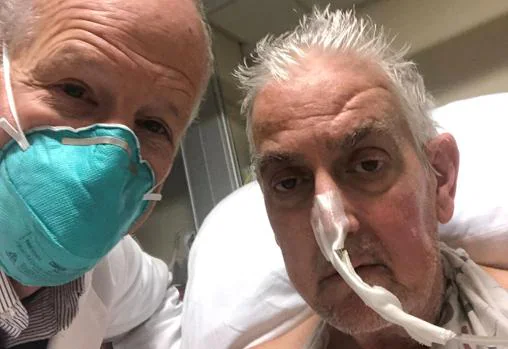Correspondent in Washington
Updated:
Keep
A medical team from the United States managed to transplant successfully on Friday the heart of a genetically modified pig to a patient, whose life he saved. It is the first time that a heart transplant of this type has been successfully completed. The operation, carried out in Baltimore, lasted about seven hours.
It is still too early to know if the operation, high risk and considered very experimental, will be a success in the medium or long term, but doctors at the University of Maryland said yesterday that in itself it is an important step in the use of genetically modified animals in order to save lives.
«It is a revolutionary surgery and brings us one step closer to solving the organ shortage crisis“Said Bartley P.
Griffith, the doctor who surgically transplanted the patient’s pig heart. “The truth is that there are not enough human donor hearts available to meet the long list of potential recipients,” added the doctor. “We are proceeding with caution, but we are also optimistic that this surgery, the first in the world of its kind, may provide an important new option for patients in the future.”
The patient is called David Bennett, 57 years old, and is a resident of Maryland, where he works as a maintenance operator. Before the surgery, he made statements to the team at the University of Maryland, which released them in a statement announcing the initial success of the transplant: “It was either dying or doing this transplant. I want to live. I know it’s a long shot, but it’s my last option.
This same Monday, according to the doctors, the patient was breathing on his own. The next few weeks will be crucial, as Bennett recovers from surgery and doctors closely follow the evolution of his coronary capacity.
In general, there is a great shortage of donors for transplants worldwide, which in recent years has led scientists to investigate whether animals can be used instead, and whether they can be genetically modified so that their organs resemble humans.
Last year there were 3,800 heart transplants in the US, a record number, according to the country’s transplant system supervisor.
In this case, the government authorized the transplant through the Medicines Agency, which oversees this type of treatment and intervention.
According to a report by Maryland doctors, 10 genetic modifications were made to the donor pig. First, three genes that are responsible for human rejection of pig organs by antibodies were removed from the animal. In addition, six human genes responsible for the immunological acceptance of the pig heart were inserted into the genome. Lastly, an additional gene was deleted in the pig to prevent overgrowth of the animal heart tissue.

Until now, these doctors had succeeded in transplanting modified pig hearts into apes, which have lived up to nine months. According to Muhammad M. Mohiuddin, professor of surgery at the same University of Maryland, “This is the culmination of years of very complex research to perfect this technique.” In addition, this researcher adds that this procedure, “successful, provides very valuable information to help the medical community improve this method that can save lives in future patients.”
This type of animal-to-human transplant was first tried in the 1980s, but they were largely abandoned after the famous Stephanie Fae Beauclair case. The baby, who was born with a serious heart condition, received a simian heart transplant in California and died a month after the procedure due to immune system rejection of the heart.
Several biotechnology companies have now developed pig organs to transplant them into humans, taking advantage of the fact that the valves of these and those of the animal are similar. The pig used for Friday’s operation came from Revivicor, a subsidiary of United Therapeutics.
www.abc.es
George is Digismak’s reported cum editor with 13 years of experience in Journalism